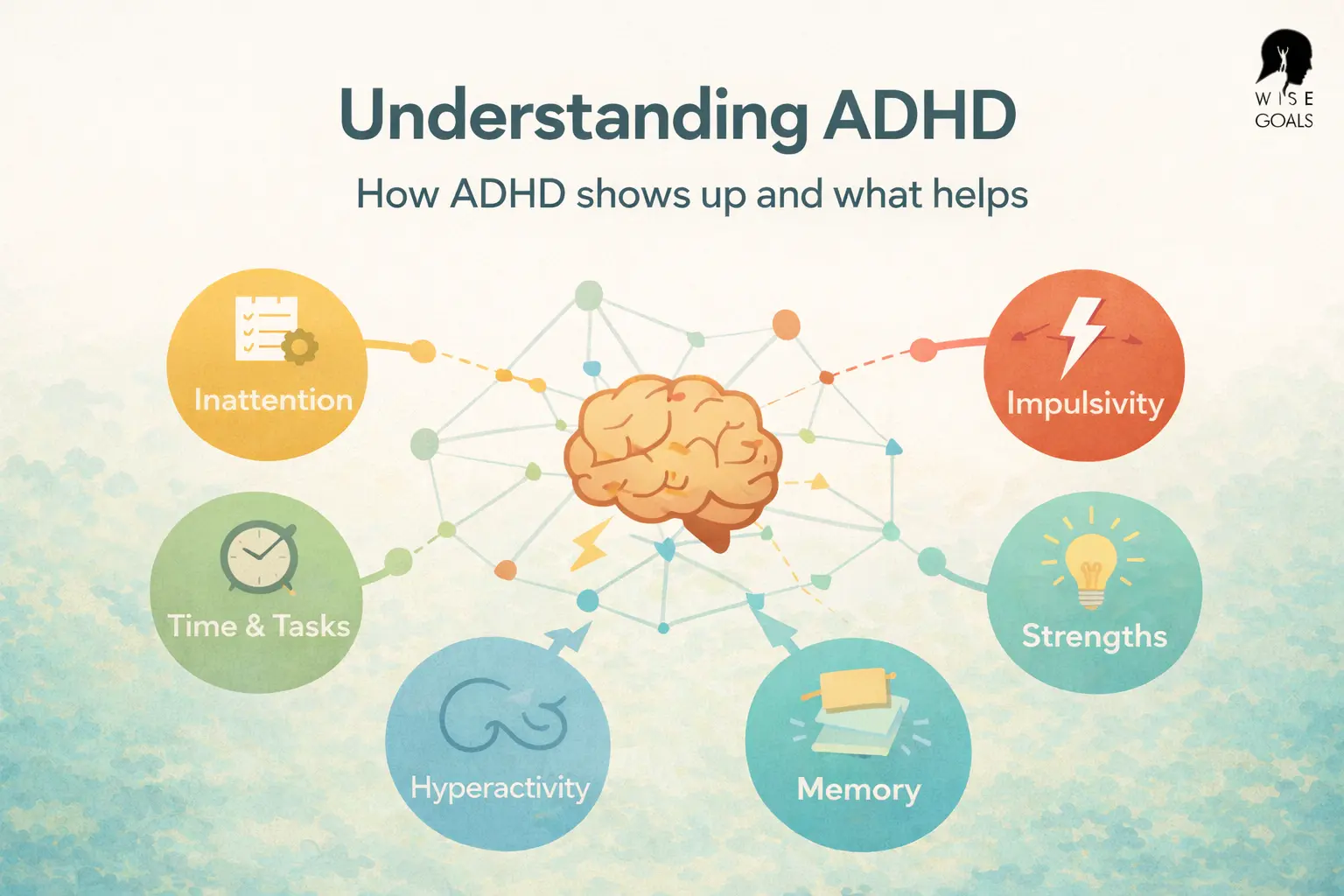- Home
- About ADHD
ADHD: A Comprehensive Guide
Do you want to understand ADHD—what it is, how it shows up in everyday life, and what support is available. Whether you're exploring ADHD for yourself, your child, or someone you care about, you'll find clear, compassionate, and practical information here.

What is ADHD?
ADHD stands for Attention-Deficit/Hyperactivity Disorder, a neurodevelopmental condition that affects the way people focus, regulate their impulses, manage time, and organize tasks. It is not a disease or a character flaw—it's simply a different way the brain processes information and responds to the world.
There are three main types of ADHD:
- Inattentive type (formerly known as ADD)
- Hyperactive-impulsive type
- Combined type (a mix of inattentive and hyperactive traits)
While often diagnosed in childhood, ADHD can persist into adulthood and may go undiagnosed for years—especially in women and those with the inattentive type.
Common Symptoms of ADHD
Symptoms vary depending on age, gender, and ADHD type, but they commonly include:
Inattention
- Easily distracted by sounds, thoughts, or environmental stimuli
- Difficulty staying focused on tasks or conversations
- Frequently forgetting things
- Trouble with consistency or completing tasks
Hyperactivity / Impulsivity
- Fidgeting or difficulty sitting still
- Talking excessively or interrupting others
- Acting without thinking (impulsive decisions)
- Feeling internally restless or on edge
ADHD doesn’t just affect attention. It can impact emotional regulation, memory, and even sleep. Many people with ADHD also experience related challenges like anxiety, depression, or low self-esteem.
ADHD in Adults vs. Children
ADHD looks different across the lifespan. In children, it might show up as high energy, trouble sitting still, or difficulty at school. In adults, it often appears as lateness, forgetfulness, procrastination, or feeling overwhelmed by everyday demands.
Many adults are diagnosed only after one of their children is assessed—realizing that their own lifelong struggles finally have a name.
ADHD in women and girls is especially underdiagnosed and often mistaken for anxiety, daydreaming, or mood disorders.
What Causes ADHD?
ADHD is believed to have a strong genetic basis. Brain imaging studies have shown differences in the structure and activity of certain brain regions related to attention, impulse control, and executive functioning.
Environmental factors during pregnancy, premature birth, and exposure to toxins may also play a role. Importantly, ADHD is not caused by poor parenting, too much sugar, or lack of discipline.
How ADHD is Diagnosed
There’s no single test for ADHD. Diagnosis is based on a detailed assessment, which may include:
- Clinical interviews
- Behavioural questionnaires
- History of symptoms
- Reports from family or teachers
- Tests such as the QbTest
Assessments can be carried out by a psychologist, psychiatrist, or specialist ADHD service. In some countries, including the UK, diagnosis can be done via the NHS or privately. Due to long waiting lists, many people are accessing quicker treatment through the NHS Right to Choose scheme, where private services like ADHD 360 deliver assessments on behalf of the NHS.
If you think you or someone you care about might have ADHD, the first step is often speaking with a GP or mental health professional.
Treatment and Support Options
There is no "cure" for ADHD, but many tools and supports can help people manage it effectively. Treatment usually includes a combination of:
- Medication (e.g., stimulants or non-stimulants)
- Therapy (especially CBT and psychoeducation)
- ADHD coaching (practical, strengths-based support for daily life)
- Lifestyle strategies (diet, exercise, sleep, mindfulness)
Everyone is different. Some may benefit from medication, others may prefer non-medical approaches, or a blend of both.
ADHD Strengths and Challenges
While ADHD comes with real challenges, it also brings strengths:
- Creative problem-solving
- Hyperfocus on meaningful tasks
- Energy, enthusiasm, and empathy
- A unique way of seeing the world
The key is learning how to channel these traits positively and reduce the impact of difficulties.
Coaching and Support at WiseGoals
At WiseGoals, we offer specialist ADHD coaching to help people understand how ADHD affects their daily lives and work—and what they can do about it.
We support adults, students, professionals, and parents through personalised, goal-based coaching. Whether you're newly diagnosed or just suspect ADHD might be part of your story, coaching can help you:
- Gain clarity
- Build routines
- Strengthen self-trust
- Follow through on your intentions
We also offer guidance on getting workplace support (e.g., Access to Work in the UK) and can signpost you to further resources.
Learn More
Use the links below to explore further:
- Home
- About ADHD
Affiliated With
We are proud to be part of professional networks that value evidence-based practice, inclusion, and social impact.




